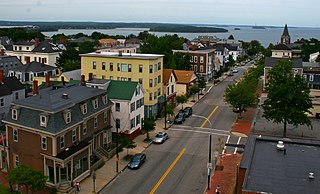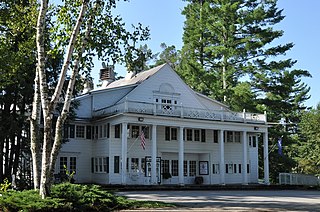
In American theater, summer stock theater is a theater that presents stage productions only in the summer. The name combines the season with the tradition of staging shows by a resident company, reusing stock scenery and costumes. Summer stock theaters frequently take advantage of seasonal weather by having their productions outdoors, under tents set up temporarily for their use, or in barns.

Casco Bay is an inlet of the Gulf of Maine on the coast of Maine in the United States. The National Oceanic and Atmospheric Administration's chart for Casco Bay marks the dividing line between the bay and the Gulf of Maine as running from Bald Head on Cape Small in Phippsburg west-southwest to Dyer Point in Cape Elizabeth. The city of Portland and the Port of Portland are on Casco Bay's western edge.

Peaks Island is the most populous island in Casco Bay, Maine. It is part of the city of Portland and about 3 miles (4.8 km) from downtown. The island is served by Casco Bay Lines and has its own elementary school, library, and police station. Due to its size, it is the only island in Casco Bay that allows cars throughout.

Great Lakes Theater, originally known as the Great Lakes Shakespeare Festival, is a professional classic theater company in Cleveland, Ohio, United States. Founded in 1962, Great Lakes specializes in large-cast classic plays, often performing the works of Shakespeare. The company performs its main stage productions in rotating repertory at the Hanna Theatre in Playhouse Square, which reopened in 2008. The organization shares a resident company of artists with the Idaho Shakespeare Festival. On its main stage and through its education programs, GLT reaches approximately 85,000 adults and students each season.

Karamu House in the Fairfax neighborhood on the east side of Cleveland, Ohio, United States, is the oldest producing Black Theatre in the United States opening in 1915. Many of Langston Hughes's plays were developed and premiered at the theater.

Fort Gorges is a former United States military fort built on Hog Island Ledge in Casco Bay, Maine, United States. Built from 1858 to 1864, no battles were fought there and no troops were stationed there. Advancing military technology, including iron clad ships and long range guns, rendered the fort obsolete before it could be used. The fort is now a park, accessible only by boat. It was added to the National Register of Historic Places in 1973.

Munjoy Hill is a neighborhood and prominent geographical feature of Portland, Maine. It is located east of downtown and south of East Deering. In the nineteenth and twentieth centuries, the neighborhood had a large Irish and Italian American population.

Eagle Island is an island in Maine's Casco Bay and the site of the summer home of the North Pole explorer Admiral Robert Peary (1856–1920). The island and home are preserved as the Eagle Island State Historic Site.

The Coconut Grove Playhouse was a theatre in the Coconut Grove neighborhood of Miami, Florida, United States. The building was originally constructed as a movie theater called the Player's State Theater. It opened on January 1, 1927, as a part of the Paramount chain. The movie house was designed by the architect Richard Kiehnel of Kiehnel and Elliott. It was built by local realtors Irving J. Thomas and Fin L. Pierce. Albert Peacock was the contractor.

The Old Port is a district of Portland, Maine, known for its cobblestone streets, 19th-century brick buildings and fishing piers. The district contains boutiques, restaurants and bars.

Portland City Hall is the center of city government in Portland, Maine. The fourth city hall built in Portland, it is located at 389 Congress Street, on a prominent rise, anchoring a cluster of civic buildings at the eastern end of Portland's downtown. The structure was built between 1909 and 1912 and was listed on the National Register of Historic Places in 1973.
William Lawrence Bottomley, was an American architect in twentieth-century New York City; Middleburg, Virginia; and Richmond, Virginia. He was known for his Colonial Revival designs of residential buildings in the United States and many of his commissions are situated in highly aspirational locations, including Monument Avenue in Richmond, Virginia.

Deertrees Theatre is a performing arts center located in Harrison, Maine, United States. The theatre was founded by the distinguished opera director and singing coach Enrica Clay Dillon in 1936 and is now owned and operated by the non-profit Deertrees Foundation. As home to the Deertrees Theatre Festival, the Sebago-Long Lake Music Festival, the BackStage Gallery, and the Salt Lick Cafe, Deertrees is one of the most active summer theatres in the Northeast. Listed on the National Register of Historic Places and the Maine Register of Historic Places, it is sanctioned by the Actors' Equity Association as "a small professional house."
Portland, Maine, is home to many neighborhoods.
Monument Square is a town square in downtown Portland, Maine, about halfway between the East Bayside and Old Port neighborhoods. One Monument Square and One City Center are among the buildings on the square itself, while the Time and Temperature Building, Fidelity Trust Building and the main branch of the Portland Public Library are on Congress Street, across from the square.

Ogunquit Playhouse is a regional theater on 10 Main Street in Ogunquit, Maine. Ogunquit Playhouse is one of the last remaining summer theaters from the Summer Stock which still produces musical theatre. The Playhouse is listed on the National Register of Historic Places as a National Level of Significance "in consideration of the significant contributions made by its founder Walter J. Hartwig and the Playhouse to Performing Arts Education throughout the nation."
The following is a timeline of the history of the city of Portland, Maine, USA.

The Fifth Maine Regiment Community Center is a historic building at 45 Seashore Avenue on Peaks Island, an island neighborhood of Portland, Maine in Casco Bay. It was built in 1888 by American Civil War veterans "as a memorial to their deceased comrades and as a reunion hall for themselves." It was listed on the National Register of Historic Places in 1978 and designated a Greater Portland Landmark in 1984. Today it is open as a museum.

The Lakewood Theater is a theater complex at 76 Theatre Road in Madison, Maine, on the shores of Lake Wesserunsett. Founded in 1898 but only properly developed in 1901, it is one of the oldest summer theaters in the United States. The theater was in the 1920s and 1930s one of the major off-Broadway stops, and now plays host the community theater productions of Curtain Up Enterprises. The main auditorium is located on a former 1882 religious camp meeting sanctuary that was extensively altered in 1925-26 to accommodate the theater. It was listed on the National Register of Historic Places in 1975.

The Eighth Maine Regiment Memorial, now the 8th Maine Lodge, is a historic summer fraternal meeting house at 13 Eighth Maine Avenue on Peaks Island, an island neighborhood of Portland, Maine. Built in 1891 as a reunion site for veterans of the American Civil War 8th Maine Volunteer Infantry Regiment, it is a fine example of Shingle style architecture, and an important work of the local architectural firm of Fasset and Tompson. It was listed on the National Register of Historic Places in 2006, and presently operates as a summer lodge and museum, with rooms rented to the public.

















